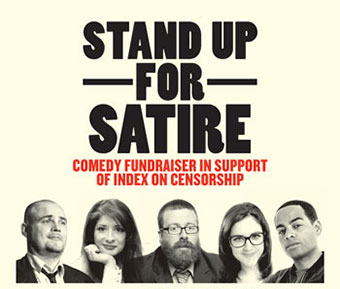12 Aug 2015 | Events, mobile

Photo – Ramy Essam, Tahrir Square – Festival 800
Join us in Lincoln for Festival 800, a celebration of the 800th anniversary of the sealing of the Magna Carta – a unique and powerful statement that began the world’s march to freedom and liberty.
Index on Censorship are delighted to be supporting Festival 800 and Freemuse who are staging a special day focused on musicians who have been banned from performing their work in their own countries. Events include:
13:30 – Listen to the Banned
Listen to the Banned is a compilation album that features the music of banned, censored and imprisoned artists from the Middle East, Africa and Asia. Project co-founders, music producer Deeyah Khan and Ole Reitov, executive director of Freemuse discuss the album’s origins and their wider work. Khan is a critically acclaimed composer, award-winning documentary film director and celebrated human rights activist. (£8)
16:00 – Talking With the Banned
Two international musicians who have faced censorship, “exiled bard of the Egyptian revolution” Ramy Essam and Basque artist Fermin Muguruza, join others including Deeyah Khan, editor of Index on Censorship magazine Rachael Jolley, and author and academic Martin Cloonan (chair) for a conversation about censorship. (£5)
19:30 – The Banned – Live and unplugged in concert.
A live gig featuring folk musician Ramy Essam who was catapulted to fame by the events of Tahrir Square; Lavon Volski, an icon of Belarusian rock music and Fermin Muguruza, who sings against the oppression that he feels Spain has over Basque Country. With Attila the Stockbroker as MC. (£10)
When: Saturday 5 September 2015, timings as above.
Where: Lincoln Performing Arts Centre, LN6 7TS (map)
Tickets: Special Index offer for whole day £15, quote INDEX when booking.
11 Aug 2015 | Academic Freedom, Magazine, mobile, Student Reading Lists
Articles from this list explore the topic of how minority groups are both being censored and also evade censorship. Includes Kerry Brown on the censored minorities of China at the time of the 2008 Olympic Games and Akeel Bilgrami on the plight of India’s Muslims after 9/11.
Students and academics can browse the Index magazine archive in thousands of university libraries via Sage Journals.
Minority groups and censorship articles
Minorities and the media by Anthony Smith
Anthony Smith, March 1975; vol. 4, 1: pp. 105-106
A study in the use of media by the Mexican Chicano Movement
Enemies Within by Kerry Brown
Kerry Brown, May 2008; vol. 37, 2: pp. 152-161
Kerry Brown on the censored minorities of China
Speaking in Tongues by Lambros Baltsiotis, Leonidas Embiricos
Lambros Baltsiotis, Leonidas Embiricos, March 2001, vol. 30, 2: pp. 145-151
A deconstruction of minority languages in Greece and a look at the battle to keep these languages alive
Just a Question of Money? By Moussa Awuonda
Moussa Awuonda, April 2003, vol. 32 no. 2 187-191
Kenyan journalist Moussa Awuonda details the report pressing the Swedish government to pay more attention to its minority presses
India’s Muslims Post 9/11 by Akeel Bilgrami
Akeel Bilgrami, November 2006, vol. 35, 4: pp. 15-21
Akeel Bilgrami delivers an explosive narrative on how India’s Muslim minority has responded to the aggressive ideology of the majority Hindus
Silencing the disabled: Only the state may help the disabled; others who try are repressed by Steven Marc Glick
Steven Marc Glick, October 1981, vol. 10, 5: pp. 32-33
Author Steven Marc Glick reports from the former Soviet Union on the plight of disabled individuals and new attempts by some to help them
Down The Welsh Road by George Jones
George Jones, July 2001, vol. 30, 3: pp. 206-211
George Jones on the linguistic rights of the Welsh-speaking minority in Wales
Speaking in Tongues by Ayer Neier
Ayer Neier, March 1996, vol. 25, 2: pp. 139-141
The ex-executive director of Human Rights Watch on the danger of suppressing minority languages worldwide
Daring to speak one’s name: A reflection on gay censorship by Alberto Manguel
Alberto Manguel, January 1995, vol. 24, 1: pp. 14-31
As Russian law relaxes and allows homosexual writers a voice, Alberto Manguel reflects on gay censorship in the country
The landscape for religious freedom in the new Egypt by Shahira Amin
Shahira Amin, June 2013, vol. 42, 2: pp. 102-109
Two years after the revolution in Egypt, Shahira Amin reflects on the minority communities who are still trying to get their voices heard
The reading list for minority groups and censorship can be found on the Sage website
4 Aug 2015 | Academic Freedom, Magazine, mobile, Student Reading Lists
The arts are an incredibly popular outlet for free expression but too often they are restricted. Index on Censorship have recently published a number of law packs informing artistic organisations of their rights when having their works challenged.
This reading list combines a number of articles from issues of Index on Censorship throughout the years dealing with censorship in the arts. It includes an examination of street art as a symbol of freedom in Egypt and a look by Andrea Webster at the policing of theatre in Indonesia.
Students and academics can browse the Index magazine archive in thousands of university libraries via Sage Journals.
Censorship in the arts articles
Hard times for poetry by Michael Morley
Michael Morley, June 1973; vol. 2, 2: pp. 23-26
Michael Morley discusses the poetry of German singer-songwriter Wolf Biermann
Image Control by Zoriah Miller
Zoriah Miller, November 2008; vol. 37, 4: pp. 50-68
Photojournalist Zoriah Miller on the US military’s battle to stop him from revealing the true cost of the war in Iraq
Art or Vandalism? By Yasmine El Rashidi
Yasmine El Rashidi, September 2011; vol. 40, 3: pp. 78-88
A look at how street art has become a growing symbol of freedom of expression on the streets of Cairo
Freedom to Publish by Richard Kostelanetz
Richard Kostelanetz, March 1975; vol. 4, 1: pp. 58-60
The American artist, author and critic on the freedom to publish works
Play politics: policing theatre in Indonesia by Andrea Webster
Andrea Webster, July 1991; vol. 20, 2: pp. 73-5
How popular theatre in Jakarta, Indonesia is being stifled by the regime of President Suharto
Artful words by Nadine Gordimer
Nadine Gordimer, May 1997; vol. 26, 3: pp. 30-33
Nobel Prize-winning Nadine Gordimer on disagreements surrounding the role of literature in society
Censorship? What censorship? By Ursula Owen, Marie Korpe, Ole Reitov
Ursula Owen, Marie Korpe, Ole Reitov, November 1998; vol. 27, 6: pp. 5
Former Index editor Ursula Owen, along with Marie Korpe and Ole Reitov, introduces Index’s special report on music in censorship
Bring Music, Bring Life by Clemency Burton-Hill
Clemency Burton-Hill, September 2010; vol. 39, 3: pp. 11-19
Clemency Burton-Hill speaks to Daniel Barenboim about how government’s continue to fear the power and influence of music
Global View: Artists on the frontline of censorship battles by Jodie Ginsberg
Jodie Ginsberg, September 2014; vol. 43, 3: pp. 67-69
Index CEO Jodie Ginsberg deconstructs why artists are so often on the front line of censorship battles
The reading list for censorship in the arts can also be found over on the sage website
27 Jul 2015 | Academic Freedom, Magazine, mobile, Student Reading Lists
Index on Censorship has had a longstanding interest in the issue of freedom of expression relating to satire. Drawing on Index on Censorship magazine’s more than 40-year-archive, this reading list compiles articles looking at the relationship between comedy and censorship, including a recent piece by Samm Farai Monro aka Comrade Fatso, founder of Zambezi News, Zimbabwe’s leading satirical news programme.
Students and academics can browse the Index magazine archive in thousands of university libraries via Sage Journals.
Comedy and censorship articles
Comedy of Terrors: Zimbabwean satirists challenge power by Samm Farai Monro
Samm Farai Monro, June 2015; vol. 44, 2: pp. 78-82.
Samm Farai Monro, aka Comrade Fatso, talks about founding Zimbabwe’s leading satirical show, and how the nation’s comedians challenge politicians and take on longstanding taboos
Out in Africa by Scott Capurro
Scott Capurro, March 2001; vol. 30, 2: pp. 190-194.
Stand up comedian Scott Capurro explores the limits of stand-up comedy in South Africa
Laughter Lines by Arthur Matthews
Arthur Matthews, March 2015; vol. 44, 1: pp. 86-88.
Co-writer of comedy sitcom, Arthur Matthews discusses censorship in comedy and satire in Ireland
Opiate of the Masses by Saeed Okasha
Saeed Okasha, November 2000; vol. 29, 6: pp. 106-111.
“No matter what form it takes, comedy is a political act in the first degree. It serves as an outlet for frustrations and is a way of putting impossible and incomprehensible situations into perspective. Egyptian society today is urgently in need of such therapy”
Comfort Zones by Scott Capurro
Scott Capurro, November 2000; vol. 29, 6: pp. 134-138.
Stand-up Comedian Capurro provides commentary on how political correctness stifles comedy
South Korea: A Serious Business by Andrew H. Malcolm
Andrew H. Malcolm, July 1978; vol. 7, 4: pp. 62.
A brief look at how comedy was strictly censored in South Korea, as the “serious government has cracked down on humour.”
Side road, dark corner by Edgar Langeveldt
Edgar Langeveldt, November 2000; vol. 29, 6: pp. 86-89.
A stand-up comedian in Zimbabwe describes the dangers comedians face for covering controversial topics, including an account of his own violent attack in 1999.
They shoot comedians by Jamie Garzon
Jamie Garzon, January 2000; vol. 29, 1: pp. 132-133.
Transcripts of television satires by journalist and humourist Jaime Garzon. In August of 1999, Garzon was executed on his way to the Radionet studio.
How to Win Friends and Influence an Election by Rowan Atkinson
Rowan Atkinson, May 2005; vol. 34, 2: pp. 117-120.
Atkinson, a foremost British comedian, opposes the government’s proposed law of Incitement of Religious Hatred in a speech given at the House of Lords, as he considers its dire effects on his profession.
Dark Magic by Martin Rowson
Martin Rowson, February 2009; vol. 38, 1: pp. 140-164
Author and cartoonist Martin Rowson expounds on satire, discussing how breaking cultural taboos often stimulates the best political satire
Confronting fear with laughter by Martin Smith
Martin Smith, January 1992; vol. 21, 1: pp. 8-10.
Smith writes about the terror that Burma’s army has inflicted, specifically mentioning the comedian Zargana, who was punished for his bold, pointed jokes.
Comedy is everywhere by Milan Kundera
Milan Kundera , November 1977; vol. 6, 6: pp. 3-7
Banned novelist, playwright, and short story writer Kundera writes on committed literature, the death of the novel, the nature of comedy, and more topics.
“Comedy isn’t here simply to stay docilely in the drawer allotted to comedies, farces and entertainments, where ‘ serious spirits’ would confine it.”
Egypt: Shame on the censor by Karim Alrawi
Karim Alrawi, December 1983; vol. 12, 6: pp. 40..
Discusses the charges filed against the comic actor Said Saleh
“We can only assume that Said Saleh has been made an example of for the shameful act of making people laugh.”
The reading list for comedy and censorship can also be found at the Sage website.
 Index on Censorship has been publishing articles on satire by writers across the globe throughout its 43-year history. Prior to our event, Stand Up for Satire, we published a series of archival posts from the magazine on satire and its connection with freedom of expression.
Index on Censorship has been publishing articles on satire by writers across the globe throughout its 43-year history. Prior to our event, Stand Up for Satire, we published a series of archival posts from the magazine on satire and its connection with freedom of expression.
14 July: The power of satirical comedy in Zimbabwe by Samm Farai Monro | 17 July: How to Win Friends and Influence an Election by Rowan Atkinson | 21 July: Comfort Zones by Scott Capurro | 24 July: They shoot comedians by Jamie Garzon | 28 July: Comedy is everywhere by Milan Kundera




